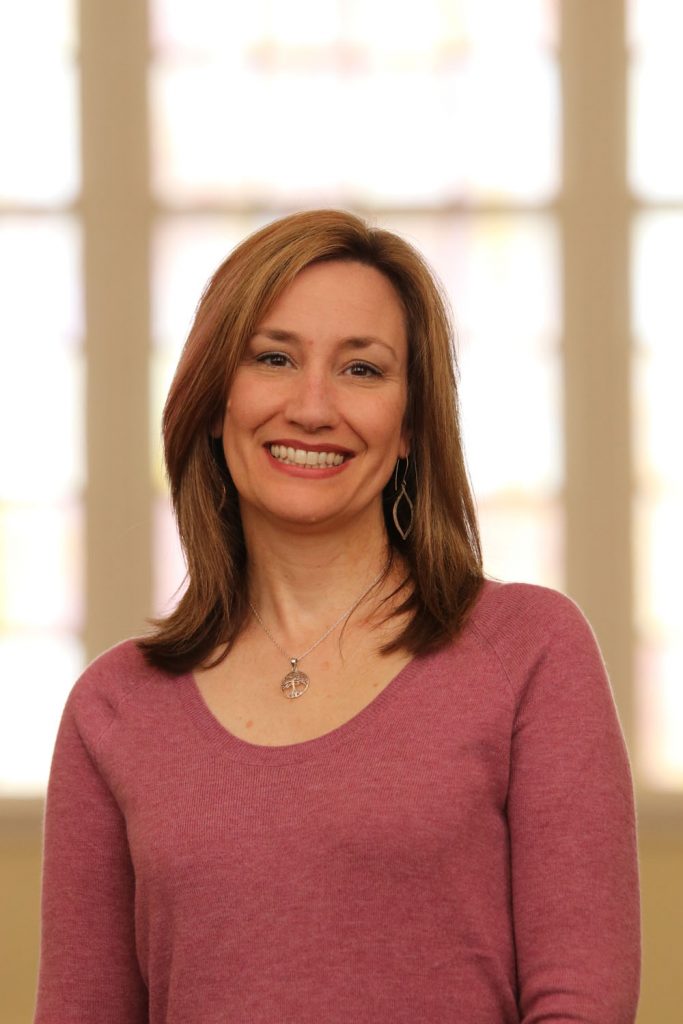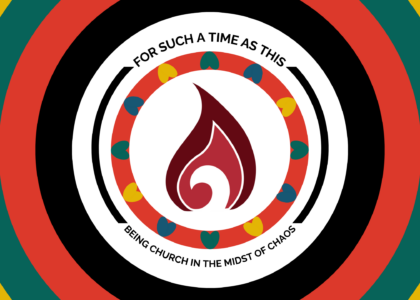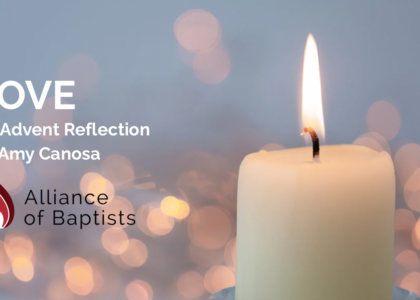by Melanie Vaughn-West
On Sunday, I gave those at Oakhurst Baptist Church an assignment: watch the Netflix movie, Don’t Look Up. I’m a huge believer in no spoilers, so I will not tell you anything that isn’t in the trailer. It’s an all-star cast with Jennifer Lawrence and Leonardo DiCaprio playing scientists who discover a planet-killing comet headed straight towards Earth.
They immediately go to the president, played fabulously by Meryl Streep, and her Chief of Staff, who also happens to be her son, played by Jonah Hill. The president is an all-out narcissist concerned only with herself and spinning her latest scandal.
But what becomes so much more disturbing than the president’s narcissism is the portrayal of how complete self-absorption, shallowness, and total distraction have permeated every aspect of our culture. While watching the movie, I got that sinking feeling that maybe this could be about me, too. When I’m not looking up, how can I attend to the sacred world around me?
In Oakhurst’s scripture passage for Sunday, January 23, Mary and Joseph bring baby Jesus to the temple for dedication (Luke 2:22-38). As soon as Mary and Joseph walk in, two people, Simeon and Anna, look up. They take immediate notice. They see the baby. They acknowledge him and his parents as sacred beings. They see God’s specific intention for his life. Then, they give thanks to God for the baby, and they bless him.
I’m not sure that Simeon and Anna had some special gift that allowed them a unique power to see things others could not. Instead, I think the important clue in the scripture is when Luke tells us where Simeon and Anna are looking. They are both looking towards God and toward God’s world. Luke tells us that Simeon and Anna were continually listening for God, worshiping, praying, and seeking the guidance of the Holy Spirit. They cultivated a practice of trying to see the world around them through God’s eyes. These are two people who have chosen to live life differently. They were people who had slowed down. They were the people who said “No” to the loud voices screaming, “Pay attention to this, right now,” or “Pay attention to that,” and chose instead to look in the direction that God directed.
We could say they were privileged to have the time to do this, and probably Simeon is, but Anna is a widow, one of the least privileged people of her society. I like to think of her as someone who has chosen herself which direction she will look. She has chosen to pay more attention to God and less attention to those who like to tell her who she is and how to see the world around her. I imagine her like one of my favorite Atlanta theologians, Rev. Tricia Hersey, who says that marginalized populations, especially Black people in America, must resist the culture’s demands on their spirits and bodies.1
This story of Simeon and Anna has a special place in the heart of Alliance congregation Oakhurst Baptist because of how it came to life for us. In 1980, Alliance minister Rev. Nancy Hastings Sehested was serving at Oakhurst. She had just given birth to first daughter Alayna, and she and her husband Ken were on the way home from the birthing center on Sunday morning at 11:00 a.m. Instead of going home, they decided to bring Alayna straight to their beloved community. They followed the deacons carrying the offerings down the center aisle, and after the dedication of the gifts, retired American Baptist Pastor Rev. Jim Brooks chose to look up and see them. He stepped forward to bless the baby. Nancy and Ken handed Alayna to Jim. He cradled her head in one hand and legs in the other and then lifted her way above his head, praying God’s sacred blessings on her life. This tradition continues today, although Jim retired several years ago.
Simeon, Anna, and Jim didn’t just suddenly notice the sacredness of this one particular baby. They had cultivated the gift of knowing where to look and how to look. They had practiced looking towards the beings around them through God’s eyes, and we can actually do the same. It is this kind of mindfulness, this choosing where we will direct our gaze, that opens our hearts to the magic of the world around us. Looking for God, listening for the guidance of the Holy Spirit, can lead us more naturally to the act of blessing the people, beings, and world around us.
Several years ago I did a sabbatical focused on what Christians can learn from Buddhism. One of my favorite things was going weekly to the Tibetan Buddhist center here in Atlanta for the evening compassion meditation. We would first practice nurturing and fostering compassion within ourselves and for ourselves, and then we would widen it to someone we loved, then to an acquaintance, then to someone who we find difficult, and then to the entire world. It is a phenomenal thing to sit in a room full of people who are sending out waves of love to the world. While there is no way to measure if it changed the world, it certainly changed me. I felt the power of getting to choose how I would interact with the world around me.
I think that the power of blessing can impact my social justice work in the same way. I’ve started to get a feeling that when I work for our world to be more loving and just, while simultaneously thinking negative thoughts about those who I perceive are making it less loving and less just, it is like having my foot on the gas and the brake of my car at the same time. When I write a letter to one of my representatives who doesn’t agree with me, I’ve started a fun experiment to see if I can send that email with a blessing. Can I make a phone call to a staffer with the energy of blessing? Can I march for justice while sending loving kindness to those I want to be more loving?
Episcopal Priest and author Barbara Brown Taylor writes that “To pronounce a blessing on something is to see it from the divine perspective. To pronounce a blessing is to participate in God’s own initiative. To pronounce a blessing is to share God’s own audacity. (206, Brown Taylor, An Altar in the World). That’s what Simeon and Anna did in the temple that day. They saw Jesus from God’s perspective and they believed in the audacity of what God was doing in the world through this baby.
This story is an invitation to slow down, to choose where we look, to see the world through the eyes of God, and then to practice pronouncing blessing upon it. When we slow down enough to truly see and to bless our own selves, to bless our loved ones, and to bless even those we would call our enemies, what we notice is that the world becomes different for us. We begin to regain a little of the magical nature of this place. We remember that we belong to it, we are a part of it. And in doing so, we become naturally more interested in it, more invested in it, more loving towards all of it. Then, any direction we look, we see the restoring of this created order to the beautiful kin-dom of God, the heaven on earth, the realm of loving justice that God ultimately intended.

The Rev. Melanie Vaughn-West serves as pastor of congregational partner Oakhurst Baptist Church in Decatur, GA. She loves talking about Family Systems Theory, the Enneagram, and the Myers-Briggs Type Indicator and loves to explore the subtle and surprising ways that God communicates with God’s children, especially through animals, trees, and dreams.





Recent Comments